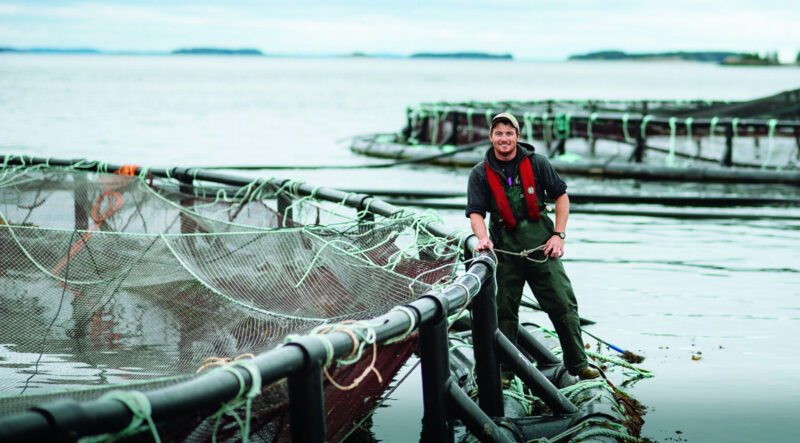Aquaculture in Canada: a tale of two coasts
Need for Canada to have a consistent regulatory framework for the aquaculture sector on full display
By Fabian Dawson
SeaWestNews
The need for Canada to have a consistent regulatory framework for the aquaculture sector is on full display with the East Coast embracing seafood farming, while salmon farmers on the West Coast are being dealt another blow by the Department of Fisheries and Oceans (DFO).
In the East Coast, ministers responsible for aquaculture in the Atlantic provinces – New Brunswick, Nova Scotia, Prince Edward Island and Newfoundland & Labrador – have agreed to the ongoing development and management of their industries based on common principles.
A new memorandum of understanding was signed by four ministers last week, which extends the previous agreement signed in 2008.
“In a time when food security is especially important, it is good to see our aquaculture industry has grown steadily and is poised for continued growth in 2021 based on environmentally responsible, science-based policies and practices,” said Keith Colwell, Minister of Fisheries and Aquaculture for Nova Scotia.
“Our Atlantic partnership continues to help the industry grow sustainably.”
In British Columbia, it is a different story.
Salmon farmer, Cermaq, was denied a transfer licence that would have allowed it to grow out a final cycle of Atlantic salmon in the Discovery Islands, in a continuation of actions by Fisheries Minister, Bernadette Jordan, who has ignored scientific advice by her staff to bow to the demands of anti-fish farm activists.
In April, Mowi was also denied a transfer licence, resulting in the needless culling of nearly 1 million juvenile salmon and job losses.
The licence denials come after Minister Jordan’s decision last December to phase out salmon farms in BC’s Discovery Islands, despite her own scientists saying that the marine operations pose less than a minimal risk to wild fish migrating through the area. She also ignored her deputy minister’s recommendation for a more coordinated approach to the closures, which was primarily pushed for by anti-fish farm activists, many operating from the Metro Vancouver area.
Minister Jordan is now citing “social acceptability” as the reason for continuing the licence denials and phase-out of net pen salmon farms in BC – another term to acknowledge that the anti-salmon farming lobby is a huge voter base for the Liberals.
The fish farmers have applied for a judicial review of the minister’s decision.
In its entirety, Minister Jordan’s unexpected Discovery Islands’ decision will see BC losing almost $390 million in annual economic output with $87 million less in annual salaries and benefits, and 1,498 fewer jobs, according to an independent economic analysis.
The current regulatory framework for aquaculture in Canada, involves multiple provincial and federal departments, with Fisheries and Oceans (DFO) as the lead agency. Environment and Climate Change Canada (ECCC), Health Canada, the Canadian Food Inspection Agency (CFIA), and Transport Canada also play roles in the management of aquaculture in Canada.
Canada remains the world’s only major farmed seafood producing country without modern national legislation specifically designed to govern a responsible and sustainable aquaculture industry.
This has led to significant uncertainty for the aquaculture industry, especially for salmon farmers in British Columbia, where there is no clear, predictable path forward for tenure and license renewal.
The push for a Federal Aquaculture Act has been embraced by a cross section of businesses, industry associations, and individuals across the country, including the Canadian Federation of Agriculture, which says such legislation will improve the country’s food security.
DFO is currently in the process of developing Canada’s first-ever Aquaculture Act, which is expected to be in line with the Liberal Government’s pre-election pledge to transition away from open-net pens on the West Coast while allowing it in the East Coast.
Meanwhile, anti-fish farm activists in BC continue pushing out their questionable science to back their unfounded claims and alarm the public about salmon aquaculture.
They seem to be getting traction to divide the public, primarily because of a media that refuses to hold truth to the activism, said an industry source.
“They issue these public statements about their studies to generate headlines…when it is corrected they go silent and so does the media which pumped up the falsehoods,” he said.
In Atlantic Canada, the public does not seem to be so gullible.
A recent survey found 80 per cent of Atlantic Canadians support aquaculture and agree that local salmon farming is a reliable and sustainable source of protein.
The poll also found 84 per cent of Atlantic Canadians agree sustainable aquaculture helps to ensure food security in our region.
“Atlantic Canadians have created an aquaculture sector that is uniquely their own and that has always been based in research and science,” said Susan Farquharson, Executive Director of the Atlantic Canada Fish Farmers’ Association.
“Support for our homegrown industry has consistently remained high here in Atlantic Canada as farmers, government, researchers and conservationists have collaborated to sustainably build it.”
Atlantic Canada’s salmon farming sector generates more than 8000 jobs and contributes over $2 billion to the Canadian GDP.
Farmed Atlantic salmon is BC’s top seafood export with a total economic output of $1.6 billion. The industry currently supports nearly 6,500 full time jobs that pay 30% higher than BC’s median income.
Image courtesy of Atlantic Canada Fish Farmers’ Association

